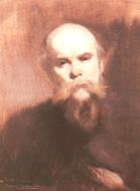Paul Verlaine Biography
Paul-Marie Verlaine (30 March 1844 – 8 January 1896) was a French poet associated with the Symbolist movement. He is considered one of the greatest representatives of the fin de siècle in international and French poetry.
Born in Metz, he was educated at the Lycée impérial Bonaparte (now the Lycée Condorcet) in Paris and then took up a post in the civil service. He began writing poetry at an early age, and was initially influenced by the Parnassien movement and its leader, Leconte de Lisle. Verlaine's first published poem was published in 1863 in La Revue du progrès, a publication founded by poet Louis-Xavier de Ricard. Verlaine was a frequenter of the salon of the Marquise de Ricard at 10 Boulevard des Batignolles and other social venues, where he rubbed shoulders with prominent artistic figures of the day: Anatole France; Emmanuel Chabrier; inventor-poet and humorist Charles Cros; the cynical anti-bourgeois idealist Villiers de l'Isle-Adam; Theodore de Banville; François Coppée; Jose-Maria de Heredia; Leconte de Lisle; Catulle Mendes, and others. Verlaine's first published collection, Poèmes saturniens, though adversely commented upon by Sainte-Beuve, established him as a poet of promise and originality.
High-heels were struggling with a full-length dress
So that, between the wind and the terrain,
At times a shining stocking would be seen,
And gone too soon. We liked that foolishness.
...
Your soul is as a moonlit landscape fair,
Peopled with maskers delicate and dim,
That play on lutes and dance and have an air
...
Your soul is like a painter's landscape where
charming masks in shepherd mummeries
are playing lutes and dancing with an air
of being sad in their fantastic guise.
...
Il pleure dans mon coeur
Comme il pleut sur la ville.
Quelle est cette langueur
Qui pénêtre mon coeur ?
...
